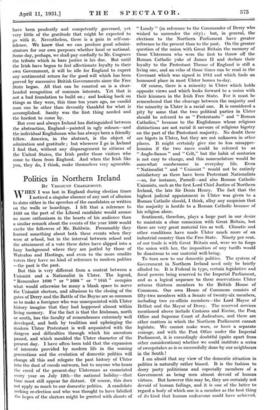Ireland of To-day
BY STEPHEN GWYNN.
ENGLISH people always believed that the Irish demand for Home Rule was a sacrifice of interest to sentiment. Possibly some nationalists thought that there were material advantages in the Union, but a few years in Parliament convinced me theoretically that the House of Commons had neither the time nor the temper to deal with Irish affairs. Within less than ten years self-government has fully justified itself in practice. The Irish Free State is a poor country but a solvent one. It has issued three loans and the stock of all three stands at a premium. Investors at home and financiers abroad have been encouraged by the prudence which has not only paid its yearly expenditure out of revenue but has also met out of current income very large expenses which might have been met by borrowing. The result is that the average citizen finds himself better off than if he lived in Northern Ireland. His income tax is three shillings in the pound against four-and-sixpence. He is affected like everyone by the world-wide stringency, but he is in one of the few countries where unemployment has not increased since 1929, and the insurance fund is so solvent that contributions from employers and employed have been reduced. In short the Irish Government has played for safety and has got it.
The standard of taxation has been kept high despite appeals for remission which could have been yielded to without disaster. The Government has never sacrificed its sense of permanent expediency to popularity. But at the same time it has taken measures much bolder than would have been advocated by any Chief Secretary or sanctioned by any House of Commons.
Take a single instance. The country is agricultural, its main trade is in cattle, but having two directions, supply of milk and supply of beef. The Department of Agriculture recognized that a standard type should be imposed and therefore that breeding should be drastically supervised. All " scrub " bulls were ordered to be slaughtered. None but certified pure-bred sires must be used. This interference was resented and led to temporary inconvenience and even hardship. There was shortage of bulls ; also pure-bred animals are less generally fertile than crossbred. But now, six years after the Irish order was issued, Dr. Addison is begging the House of Commons to let him do what was done in Ireland and Lord Winterton from the Unionist benches endorses the argument from Ireland's success. The same sort of vigilant energy has been shown in regard to dairy produce and poultry ; and here the main difficulty has been to defeat prejudices formed when English administration left the supply unregulated. Yet in fairness it should be said that English rulers would have found it difficult to face the unpopularity of such interference. Mr. Hogan has known that he could meet his opponents and critics in a Parliament that had both time and disposition to learn the merits.
The " Shannon Scheme " was, of course, a much more remarkable illustiation of the workings of Home Rule. No English Government would have undertaken it, very largely because all English Governments were deeply imbued with distrust of Irish ability to manage things. It was carried out by a Government who believed in themselves and their countrymen ; and the demand for electric power is already treading on the heels of supply. What is more, local complaints about charges for instal- lation and the like are seldom heard. The working gives satisfaction.
All this does not mean that we have reached the millennium. It does mean that we can, peculiarly well face investigation by a paper like the Financial News, which brought out an Irish supplement for Saint Patrick's Day, to which I refer readers for much information on the business side. That journal, however, does not touch the question of maintaining order, though, of course, the satisfactory position of Irish securities is a sure index of tranquillity. In point of fact life and property are at least as secure as they were under the British regime at its best. There is, however, the evil inheritance from generations of agitation by secret societies and we are nowhere free from the tendency to cloak certain classes of crime. There is a sentimental dread of being called an " informer " if help is given to the law against a man who has murdered for politics or for land. There is also a strong dose of fear, made more active because a secret armed organization is known to be widespread in defiance of the law. None of the Ministers can move about unguarded as the Chief Secretary used to do. Only the other day a police officer was riddled with bullets after he had been prosecuting men for belonging to this secret " Army." Such an act is not countenanced by Mr. de Valera and his officially Republican colleagues ; and if they come into office it is doubtful whether they will be any safer than Mr. Cosgrave's Cabinet. But up to the present Mr. de Valera has not made plain the patriotic duty to hunt down such criminals. The presence of this organization, the prevalence of this mentality, acts as the most serious drag on Ireland's movement towards prosperity. Tourist traffic, very important to 'us economically, is checked, though without reason ; for no stranger runs even a shadow of risk. This begins to be understood and last year's returns showed an increase—probably due to the fact that Ireland is a motorist's paradise. Nowhere else are there so good roads with so few cars on them. But the more serious effect of unrest arising from this secret menace is that many people, attracted by low income tax, cheap sport and the general charm of the country, yet refrain from settling here.
None the less, signs are generally hopeful which is surprising for an agricultural country at this period. Not much has been done to industrialize us. Various protective tariffs have helped existing industries and have induced British firms to set up branch factories inside the barrier. There is an increase of some 14,000 persons industrially employed (equal to nearly 250,000 for Great Britain proportionately). But the one big thing started has been the Shannon venture, a State experiment. Irishmen have not yet become pioneers in individual industry.
Naturally the British controversy as to Free Trade and Imperial preference is watched closely. We have all learnt that our prosperity depends on England's power to buy, and fully realize what preference would be worth to us if it came. But we are not always sure that English people realize how important our market is to them—buying more than France, for instance, and. buying per head more than any country except New Zealand. It is the fact that we shall best serve Great Britain economically by prudent attention to our own prosperity ; and there is less and less fear that this would be jeopardized by any change of Government here. Such change may possibly be deferred for another five years. An election held this autumn might give Mr. Cosgrave a new tenure. Unless he is confident of getting this, it is probable that the contest will be deferred by special arrangement until well after the great Eucharistic Congress to be held in the summer of "932 in Dublin. But there is no enthusiasm either for a change or for continuance. There is increasing realization that we have been -prudently and competently governed, yet very little of the gratitude that might be expected to go with it. Nevertheless, there is a .gain in self-con- fidence. We know that we can produce good admini- strators for our own purposes whether local or national. Some day, perhaps, we shall pay cordially to Mr. Cosgrave the tribute which in bare justice is his due. But until the Irish have begun to feel affectionate loyalty to their own Government, it will be idle for England to expect any sentimental return for the good will which has been proved by successive British Governments since the Free State began. All that can be counted on is a clear- headed recognition of common interests. Yet that is not a bad foundation to build on ; and looking back on things as they were, this time ten years ago, no candid man can be other than devoutly thankful for what is accomplished. Sanity was the first thing needed and the hardest to come by.
But ever and always Ireland has distinguished between the abstraction, England—painted in ugly colours—and the individual Englishman who has always been a friendly fellow. America, in the abstract, is the object of admiration and gratitude ; but wherever I go in Ireland I find that, without any disparagement to citizens of the United States, the Irish prefer those visitors who come to them from England. And when the Irish like you, they do, I think, make themselves very agreeable.











































 Previous page
Previous page